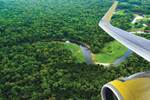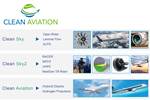First A380 powered by 100% sustainable aviation fuel takes to the skies
This is the third Airbus aircraft type to fly on 100% SAF over the course of 12 months, following an Airbus A350 and A319neo, with a goal of 100% certification for all Airbus aircraft at the end of this decade.
Share

Photo Credit: Airbus SAS, Adoumenjou/Master Films
On March 28, Airbus (Toulouse, France) performed a first A380 flight powered by 100% sustainable aviation fuel (SAF), per its commitment defined in the Feb. 4 signing of the Toulouse Declaration.
Airbus’ A380 test aircraft MSN 1 took off from Blagnac Airport, Toulouse, France, on March 25, 2022. The flight lasted about three hours, operating one Rolls-Royce (London, U.K.) Trent 900 engine on 100% SAF.
Airbus says 27 tonnes of unblended SAF were provided by TotalEnergies (Courbevoie, France) for this flight. The SAF produced in Normandy (close to Le Havre, France) was made from hydroprocessed esters and fatty acids (HEFA), free of aromatics and sulphur, and primarily consisting of used cooking oil, as well as other waste fats. A second flight, with the same aircraft, took place from Toulouse to Nice Airport on March 29, to test the use of SAF during takeoff and landing.
This is the third Airbus aircraft type to fly on 100% SAF over the course of 12 months; the first was an Airbus A350 in March 2021 followed by an A319neo single-aisle aircraft in October 2021.
Increasing the use of SAF remains a key pathway to achieving the industry’s ambition of net-zero carbon emissions by 2050, Airbus says. Key statistics outlined in the Waypoint 2050 report indicate that SAF could contribute between 53-71% of required carbon reductions.
All Airbus aircraft are currently certified to fly with up to a 50% blend of SAF mixed with kerosene. The aim is to achieve certification of 100% SAF by the end of this decade.
The A380 aircraft used during the test is the same aircraft recently revealed as Airbus’ ZEROe Demonstrator, a flying testbed for future technologies instrumental to bringing a zero-emission aircraft to market by 2035.
Related Content
-
CirculinQ: Glass fiber, recycled plastic turn paving into climate solutions
Durable, modular paving system from recycled composite filters, collects, infiltrates stormwater to reduce flooding and recharge local aquifers.
-
Watch: A practical view of sustainability in composites product development
Markus Beer of Forward Engineering addresses definitions of sustainability, how to approach sustainability goals, the role of life cycle analysis (LCA) and social, environmental and governmental driving forces. Watch his “CW Tech Days: Sustainability” presentation.
-
Natural fiber composites: Growing to fit sustainability needs
Led by global and industry-wide sustainability goals, commercial interest in flax and hemp fiber-reinforced composites grows into higher-performance, higher-volume applications.
















